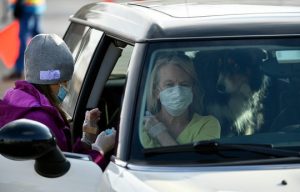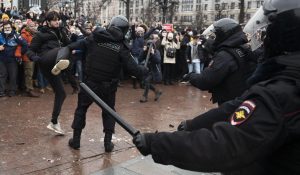Advertisement
Supported by
Coronavirus Briefing: What Happened Today
Joe Biden held a ceremony to remember the 400,000 Americans who have died during the pandemic.
- Jan. 19, 2021
This is the Coronavirus Briefing, an informed guide to the pandemic. Sign up here to get this newsletter in your inbox.

-
Brazil kicked off its nationwide coronavirus vaccination campaign, as the country battles two worrisome new variants of the virus.
-
Aides to President-elect Joe Biden said he would revoke a Trump administration order loosening travel restrictions on Europe and Brazil before it takes effect.
-
The SAT is dropping its essay section and subject matter tests to streamline during the pandemic.
-
Get the latest updates here, as well as maps and vaccines in development.
Mourning the loss of 400,000 Americans
President-elect Joe Biden held a somber ceremony at the Lincoln Memorial this evening to remember the more than 400,000 Americans who have died during the pandemic — a once unthinkable death toll and an extraordinary national loss.
“To heal we must remember,” Mr. Biden said before 400 lights were illuminated along the perimeter of the Reflecting Pool, each symbolizing 1,000 Americans who lost their lives during the pandemic. “It’s hard sometimes to remember. But that’s how we heal. It’s important to do that as a nation.”
The brief ceremony, on the eve of Mr. Biden’s inauguration, kicked off a “national moment of unity and remembrance” with commemorations at the Empire State Building in New York, the Space Needle in Seattle and other landmarks. It offered a stark contrast to the efforts of President Trump, who has repeatedly played down the severity of the pandemic and has led no national mourning for the hundreds of thousands of victims of Covid-19.
The horrific milestone of 400,000 deaths comes nearly one year after the first known Covid-19 death in the country (on Feb. 6, 2020) and as the pace of virus deaths in America is accelerating. The first 100,000 deaths were confirmed by May 27. Four months later, the U.S. recorded another 100,000 deaths. The next 100,000 deaths were logged in about three months. The latest arrived in just five weeks.
Mortality rates are not expected to peak until later this month, health experts say, and the death toll may reach 500,000 by the end of February.
But there are a few indications that the recent post-holiday surge may be slowing. The average number of cases per day has been on the decline, but, at 200,000, is still incredibly high. Hospitalizations have also finally begun to level off and on Sunday reached their lowest level since Jan. 2. However, new and more contagious variants of the virus are spreading across the country and could cause another spike in infections.
Mr. Biden will take the oath of office tomorrow and has called for an aggressive strategy for bringing the virus under control.
“You have my word that we will manage the hell out of this operation,” Mr. Biden said on Friday. “Our administration will lead with science and scientists.”
One day’s losses. A team of reporters at The Times combed through local obituaries and spoke to families to create a tapestry representing some of the lives lost to Covid-19 on a single day in January.
The failure that led to 400,000 deaths. After the White House declined to pursue a unified national strategy, governors faced off against lobbyists, health experts and a restless public consumed by misinformation.
Covid screening: Maybe the nose knows
A new study suggests that smell tests used as a screening device at places like offices, restaurants and schools could substantially lower transmission of the virus.
The tests, which often consist of stinky pieces of paper, check a person’s loss of smell, a common symptom and one of the best indicators of a coronavirus infection. Some studies suggest that about 50 to 90 percent of people who test positive for the virus lose their sense of smell. In contrast, only a minority of people with Covid-19 develop a fever, and yet fever checks have become ubiquitous as screening devices despite their unreliability.
There are drawbacks to scratch-and-sniff tests. They are not widely available, there is no real-world data that shows they’re effective when frequently deployed, and some experts worry about people’s ability to cheat on the tests. Loss of smell can also last weeks or months after a person is contagious, and other infections can cause smell loss as well.
Nevertheless, researchers argue that even with their flaws, smell tests can be useful in driving down infections because they are cheap to make (as low as 50 cents per test) and could be manufactured incredibly fast. Researchers using computer modeling found that a smell screening given multiple times a week that caught at least 50 percent of new infections was just as good at quashing outbreaks as slower, more accurate laboratory tests that were administered just once a week.
Underselling the vaccine
My colleague David Leonhardt, who writes The Morning newsletter, recently explained why vaccines are better than scientists and experts make them seem.
Scientists are naturally cautious and have offered a number of qualifiers when discussing the success of vaccines: They’re not 100 percent effective. Even vaccinated people may be able to spread the virus. And people shouldn’t change their behavior once they get their shots.
The warnings around vaccines, which have a basis in truth, can be misleading when taken as a whole, David wrote. The truth is that the Moderna and Pfizer vaccines are among the best vaccines ever created. Although there have been no rigorous studies about whether vaccinated people can spread the virus, experts say it would be surprising if they did. The vaccines are also incredibly effective in the rare cases when people catch Covid-19. Those people come down with only mild cases of the disease, a win in itself.
The Moderna and Pfizer vaccines are “essentially 100 percent effective against serious disease,” Dr. Paul Offit, the director of the Vaccine Education Center at Children’s Hospital of Philadelphia, said. “It’s ridiculously encouraging.”
Resurgences
-
Rwanda announced restrictions on movement and businesses in the capital, Kigali, as coronavirus cases continued to surge across the country.
-
Scotland’s lockdown will be extended to mid-February and its schools and kindergartens will remain closed until then.
-
Mayor Bill de Blasio said New York City expects to exhaust its supply of vaccines on Thursday, and will then have to cancel inoculation appointments at many city vaccination sites.
Here’s a roundup of restrictions in all 50 states.
What else we’re following
-
The European Union’s executive arm set ambitious vaccination goals for its 450 million citizens, including inoculating at least 70 percent of the whole population by this summer.
-
The Russian government is considering “Covid passports” that could ease travel for people who have been vaccinated, while sharply limiting the liberties of others.
-
Many nursing home workers in New York State — about 32 percent — have declined to be vaccinated.
-
Officials at U.S. prisons and jails are also running into widespread unwillingness among prisoners to be vaccinated.
-
Across the U.S., state education and school district officials say the pandemic has intensified a longstanding teacher shortage to crisis levels.
-
An American college student who spent more than month in a prison in the Cayman Islands for violating coronavirus restrictions said in an interview that she “deserved it.”
-
The new, more contagious variants of the virus are mutating in similar ways, The Atlantic reports.
-
My colleague Tara Parker-Pope explains what you can do to protect yourself from the new, more contagious variants.
What you’re doing
My 15-year-old daughter experienced a double whammy in the fall when her older brothers went off to college, while all her in-person classes and activities were canceled. She enjoys Korean TV shows, so we let her subscribe to a channel that features many of them. Her dad and I watched a couple of episodes just to keep her company, and rapidly became hooked! Best of all, we all watch them together, eating popcorn on the couch, safe in our little pod. We’ve enjoyed them so much that we’re planning a trip to Seoul when travel opens up again — something to look forward to.
— Jennifer Hanlon Wilde, Hood River, Ore.
Let us know how you’re dealing with the pandemic. Send us a response here, and we may feature it in an upcoming newsletter.
Sign up here to get the briefing by email.
Email your thoughts to [email protected].
Advertisement









